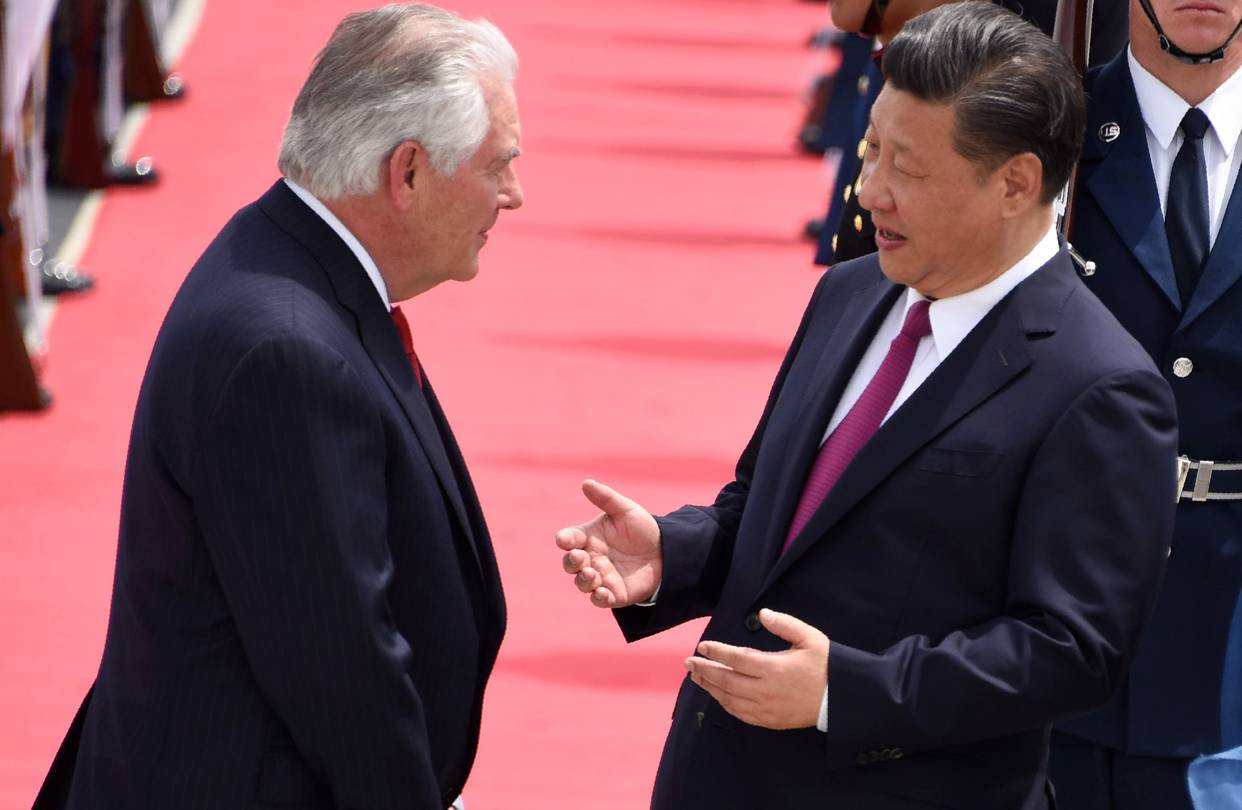The Wall Street Journal
By Marco Rubio
April 6, 2017 7:24 p.m. ET
■ History teaches that when a government tramples its people, it won’t be a responsible global citizen.
No relationship is more important to the fate of the 21st century than that between the U.S. and China. As President Trump meets this week for the first time with Chinese President Xi Jinping, it is important to strike the right tone.
 |
| Secretary of State Rex Tillerson greets President Xi Jinping in West Palm Beach, Fla., April 6. Photo: Agence France-Presse/Getty Images |
In recent days Secretary of State Rex Tillerson and other officials have rightly pressed China—North Korea’s neighbor and main economic partner—to do more to halt Pyongyang’s growing nuclear and missile threats. Mr. Trump has also focused on America’s trade deficit with China and the real concerns of workers, particularly in manufacturing, whose livelihoods have suffered since Washington granted Permanent Normal Trade Relations status to Beijing in 2000.
These issues are important. But it would be a mistake for the U.S. to view its relationship with China only through the lenses of economics or security.
Proponents of normalized trade relations argued that China’s economic growth would lead to greater political liberalization, improvements in human rights, and increased respect for the rule of law. But that isn’t what happened.
Since it joined the World Trade Organization 16 years ago, China has experienced vast economic growth and become the second-largest economy in the world. Unfortunately, this merely created a wealthy class of Communist ruling elites, who continue to maintain their grip on power through ruthless violence, oppression and censorship.
The authorities round up human-rights lawyers with impunity, and reports of torture are rampant. Labor activists and women’s-rights advocates are arbitrarily detained. Confessions are coerced and televised. Christians, Tibetan Buddhists, Uighur Muslims and Falun Gong practitioners who desire to worship and live out their faith peacefully are subjected to immense suspicion and repression.
Beijing forcibly repatriates North Korean refugees, despite knowing they will likely be imprisoned, tortured or murdered by the regime of Kim Jong Un, whose horrific abuses of his own people are crimes against humanity. The Chinese internet is controlled by a vast army of censors who maintain the “Great Firewall,” which blocks websites such as Facebook and Twitter .
As the National Endowment for Democracy recently reported, China is taking unprecedented steps to control information by “shaping international news media, guiding the evolution of the global Internet, and influencing global culture through Hollywood.” Emboldened in its extraterritorial reach, Beijing is chipping away at Hong Kong’s long-cherished and supposedly guaranteed autonomy, while conspiring with other authoritarian states to stifle independent civil society.
China is unfortunately starting to treat its neighbors in a similar way. It has increased economic and diplomatic pressure on Taiwan, a democratic ally of the U.S. under the Taiwan Relations Act. China’s illegitimate actions in the South China Sea, including flagrant violations of international norms, threaten the region’s security and the free flow of American and international commerce. Sanctions against China for continuing these aggressions should be on the table if Beijing does not show restraint in these disputes and abide by international rulings.
China’s authoritarianism, its disregard for the rule of law, and its growing desire to upend rather than support the rules-based international order should give the Trump administration pause about cutting any deals with Beijing. The long-term concerns regarding China’s rise cannot be addressed through short-term concessions. America’s strategy must instead be grounded in a comprehensive approach that addresses China’s actions.
This week the Congressional-Executive Commission on China, of which I am chairman, is highlighting individual prisoners of conscience with the hashtag #FreeChinasHeroes. These people are not statistics. They are booksellers, pastors, writers, Nobel laureates, lawyers and human-rights defenders. Their “offenses” vary but their plight is shared. They are the people who suffer as a result of President Xi’s crackdown on dissent.
These cases and others should feature prominently in President Trump’s discussions at Mar-a-Lago. Prioritizing human rights in our bilateral engagement with China is not only a moral imperative but also a strategic one.
History teaches that when a government fears its own citizens and tramples daily on their fundamental human rights, it is unlikely to become a responsible global stakeholder, abide by its international commitments, or be trustworthy in trade agreements or efforts to tackle common challenges.
This is why it is important that President Trump stand up to President Xi on these issues, rather than parroting Chinese Communist Party talking points, which purposefully mask the very real differences we have with Beijing and undermine American allies’ confidence in our intentions. Anything less would be shortsighted.
Mr. Rubio, a Republican, is a U.S. senator from Florida.
Appeared in the Apr. 07, 2017, print edition.
ChinaAid Media Team
Cell: (432) 553-1080 | Office: 1+ (888) 889-7757 | Other: (432) 689-6985
Email: [email protected]
For more information, click here
